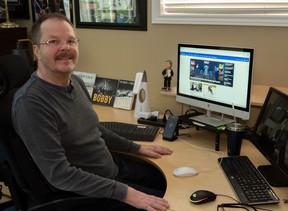“You admire his physique, his fitness … and then you get a call like this,” Darryl Sittler said

He is considered the ageless Leaf, at 71 often seen pursuing the outdoor activities of a man more than half his age.
Article content
“We get together every March or April and it looks like he can still play,” marvelled Darryl Sittler. “You admire his physique, his fitness … and then you get a call like this.”
It was a few weeks ago that Borje Salming shared the stunning news with his very close-knit kin from the 1970s Leafs. Mysterious issues the Hall of Fame defenceman was experiencing throughout his body sent him to a specialist at the Karolinska Institutet in Stockholm.
“I have received news that has shaken my family and me. The signs that indicated that something was wrong in my body turned out to be the disease ALS, also known as Lou Gehrig´s disease,” Salming stated through the Leafs on Wednesday. “In an instant, everything changed. I do not know how the days ahead will be, but I understand that there will be challenges greater than anything I have ever faced.
Article content
“I also recognize that there is no cure, but there are numerous worldwide trials going on and there will be a cure one day. In the meantime, there are treatments available to slow the progression and my family and I will remain positive.”
Salming last played for the Leafs in 1989, but was never separated from his life-long friends in the Maple Leaf Gardens era, led by Sittler, Lanny McDonald and Tiger Williams.
“Borje is a wonderful friend and great teammate,” Sittler said. “I wish I was talking about anything else today. We’ve been in contact; me, Borje, guys such as Lanny and Tiger and we all knew today (breaking the news to the rest of the world) would be the toughest and devastating for him and us.”
“We’ve been talking. If you can imagine it was you or I who was being told this … he was very emotional.”
Article content
Yet one Leaf that Salming played ever so briefly with, Mark Kirton, was the first whom Sittler thought of sharing the news, to be a great ally in the coming fight.
Kirton was also diagnosed with ALS, in 2018 after first experiencing symptoms three years earlier. Though now wheelchair bound, the 64-year-old helped Salming absorb the shock with his immediate family and helped guide him to an understanding of the slow-progression drugs available to urgently start administering.
“I told him, ‘King, the name of the game is survival until they find a cure’,” Kirton said. “You have a great support system here and with your family

Kirton, Sittler and the Leafs worked the past few days on crafting Wednesday’s release, simultaneously in Canada and Sweden, in which an upbeat-sounding Salming also asked for privacy.
Article content
“Right now, I rest assured that I have my loving family around me and the best possible medical care. Please keep us in your prayers.”
Salming is a grandfather and when others in his circle aren’t posting about how robust he still is, he’s proudly highlighting the athletic tradition carried by a new generation of the clan.
A pioneer of European migration to the NHL along with teammate Inge Hammarstrom in 1973, Salming quickly became a Leafs favourite, one of the few bright spots in years the team rarely made it deep into the playoffs. He gained respect far and wide for withstanding punishment, from shot blocks to foes bent on beating him up as a perceived pacifist in a violent period in the sport.
Yet he played more than 1,000 games in Toronto and kept in such good shape that he was often compared to the 60-year-old Swede in government Participaction ads, in as good or better shape than younger Canadians. Salming survived many injuries, including a gruesome facial cut from a skate blade that required 200-plus stitches and just missed an eye.
Article content

Two years ago, he did have a medical episode where he couldn’t breathe and was put in an ambulance, but that was chalked up to COVID-19 and he was released after one night.
Much like Kirton, who suddenly began experiencing twitching in his biceps while on holidays in the Bahamas, it was a rapid turn for the worst.
“The good news from a family perspective is he doesn’t have the genetic (familial ALS) which is 5% of cases,” Kirton said. “The most important thing now is he get all the available drugs as fast as possible at early onset.”
Patients with sporadic ALS, which Kirton and Salming are dealing with, are typically given a life span of two to five years on average, though the disease can affect people differently with longer survival rates. Kirton recalled how devastated he and his wife were to be told of his condition, but he has maintained a vow not to dim his mental positivity.
Article content
Kirton meets regularly via Zoom calls with 25 to 30 ALS patients of all ages, as well as personal caregivers, forming ALS Action Canada to give those affected a stronger voice in pushing for approval of new treatments and funding.
In the meantime, Kirton sent his old friend an encouraging tweet Wednesday.
“I’ve reminded Borje he taught me the can opener move one day at practice to take out the centre going into the corner,” laughed Kirton. “He taught me well how to get away with it and now I told hium ‘don’t worry, we’ve got this, too’.”

SALMING’S FULL STATEMENT
“I have received news that has shaken my family and me.
“The signs that indicated that something was wrong in my body turned out to be the disease ALS, also known as Lou Gehrig’s disease. In an instant, everything changed. I do not know how the days ahead will be, but I understand that there will be challenges greater than anything I have ever faced.
Article content
“I also recognize that there is no cure but there are numerous worldwide trials going on and there will be a cure one day. In the meantime, there are treatments available to slow the progression and my family and I will remain positive.
“Since I started playing ice hockey as a little kid in Kiruna, and throughout my career, I have given it my all. And I will continue to do so.
“Right now, I rest assured that I have my loving family around me and the best possible medical care.
“I understand that there are many of you that would like to reach out, however I kindly ask you to respect our privacy in these trying times. Please keep us in your prayers. When the time is right and I understand more about my condition and future journey, I will reach out. So, until such a time, we kindly refrain from all contact.
“I hope you understand and respect our decision.”


